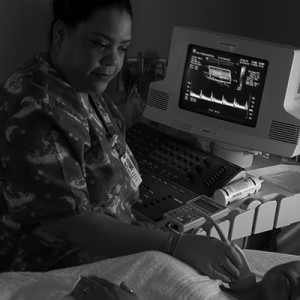If you’re interested in working in the medical field, but only have a limited amount of time and money to invest in your education, one job which may interest you is that of radiology technician. You may also hear radiology technicians referred to ad radiologic technologists or medical radiation technologists, and sometimes “radiographers.” This is a job which only requires an associate’s degree, pays reasonably well, and offers many opportunities for advancement.
Furthermore, those opportunities are only expected to increase over the coming years. In a world where many other fields are stagnating or even shrinking, that kind of growth represents some level of stability, yet another important job benefit. Interested in learning more? Read on to learn more about what radiology techs do, how much money do they make, and how you can become one.
Why Become a Radiology Technician?
As a radiology tech, you would be able to work directly with patients, which means you would have a chance to make a positive difference in other peoples’ lives. Having a good bedside manner is as important as having great technical expertise. If you work in a capacity which allows you to analyze the results and report your findings, you have an even bigger role to play in the healing of the patient. If this aspect of the work is something which interests you a great deal, you might consider a job as a radiologist instead, though it will require a far bigger educational investment.
 The other reasons to become a radiologic technologist relate to practical considerations such as salary, opportunity and educational requirements. This is a job which requires minimal educational investment, pays well, and is growing rapidly. With an aging population which is living increasingly longer, healthcare needs are only going to continue to rise. That makes the value of an associate’s degree in the field quite high in comparison to many other degrees, which take more time and money to complete, but do not pay as well in terms of opportunity and salary.Becoming a radiology tech allows you to work in a clinic, hospital, surgical centre or other medical environment. This can be an exciting, fast paced workplace where you come into contact with many co-workers and members of the public, and have a chance to interact with many people every day. You also will probably learn a great deal not only about radiology, but about other aspects of human health while you are on the job. There is a lot of flexibility with this job, since night shifts are required. So you may be able to choose your own hours, working full time or part time as you wish, and selecting specific shifts based on your needs.
The other reasons to become a radiologic technologist relate to practical considerations such as salary, opportunity and educational requirements. This is a job which requires minimal educational investment, pays well, and is growing rapidly. With an aging population which is living increasingly longer, healthcare needs are only going to continue to rise. That makes the value of an associate’s degree in the field quite high in comparison to many other degrees, which take more time and money to complete, but do not pay as well in terms of opportunity and salary.Becoming a radiology tech allows you to work in a clinic, hospital, surgical centre or other medical environment. This can be an exciting, fast paced workplace where you come into contact with many co-workers and members of the public, and have a chance to interact with many people every day. You also will probably learn a great deal not only about radiology, but about other aspects of human health while you are on the job. There is a lot of flexibility with this job, since night shifts are required. So you may be able to choose your own hours, working full time or part time as you wish, and selecting specific shifts based on your needs.
How To Become a Radiology Technician
Before you can get into this field, you’ll need to complete training and receive the proper credentials. Your first step is to start researching training programs in your area. Look for a school that offers you a formal training program which allows you to receive an associate’s or bachelor’s degree in the field or a certificate. How much education do you need? A higher degree program may help you to start out with a higher radiologist technician salary, but you will end up spending more on your education, so it all depends on your situation and what your needs are.
If you want to start working as soon as possible, and you are not as concerned about your entry-level salary, you may want to just aim for a certificate. It only takes about six months to a year to get a certification in the field. During that time, you will complete classroom work along with clinical training. Topics you will study will include anatomy, pathology, radiation, image interpretation, and patient care. An associate’s degree program will take a couple of years to complete, while a bachelor’s degree comprises a four-year educational path.
Another idea is to start out with a certification or an associate’s degree, and then go back to school to earn a higher degree part time once you’ve started working and earning money. This may speed up the process of advancement, but will allow you to get started sooner. You also can join a professional organization in order to forge new connections and build up a network.
How do you make sure that you’re using an accredited program? It is the Joint Review Committee on Education in Radiologic Technology (JRCERT) which provides accreditation for radiology technician programs. If you don’t complete an accredited program, you may not qualify for a license. The licensing requirements to become a radiologic technologist vary depending on which state you are located in. In general, you will have to graduate from an accredited program, and then pass a certification exam. The exam is dispensed by the American Registry of Radiologic Technologists (ARRT) or by the state government.
 Your training as a radiology technician is never really complete, even if you have a higher degree and earn a great salary. Over time, technology changes and new advancements are made, so you have to keep your knowledge current by completing continuing educational requirements.
Your training as a radiology technician is never really complete, even if you have a higher degree and earn a great salary. Over time, technology changes and new advancements are made, so you have to keep your knowledge current by completing continuing educational requirements.
Radiology Technician Salary
According to the Bureau of Labor Statistics (BLS), the 2010 median annual pay for a radiology technician was $54,340. The median salary per hour was $26.13. The salary radiology techs make depends on a number of factors, including experience, work environment, hours, and tasks.
Radiology techs are needed all over the countries, in both urban and rural settings. It’s a good idea to do some research on how much radiology techs make in the locations you are considering working. Sometimes developing a specialization can make your services more valuable, raising your salary. Some radiology technicians make far more than the average pay, pulling in as much as $300,000 a year. The top 10% of radiology techs made $76,850 or more, and the lowest 10% earned less than $36,510. All things considered, that isn’t a bad salary at all for a technician who has met only the minimal educational requirements. There are other fields where you can study much longer and not even make the minimal salary for radiology technicians!
Expanding Opportunities in Radiology
Just how fast are jobs in radiology growing? Radiologic technologist positions are expanding at a growth rate of 28% according to the BLS. That means that between 2010 and 2020, 61,000 new positions are projected to open up. Some of those jobs have already started to appear over the past couple of years, but a lot more jobs are waiting to be created. It’s very important to think ahead when you are planning a career, especially when an educational investment is required. The radiologist technician salary is great, and so is the amount of opportunity out there. With all those new jobs opening up, you may have a chance to advance more quickly and reach the upper salary echelons within a shorter time frame.
Job Description
What do radiology technicians do? Radiology is a specialty field in medicine which involves using visual diagnostic equipment to map out, identify and treat conditions in patients. While the term “radiology technician” is often interchangeably used with the phrase “x-ray technician,” they are not identical. Taking x-rays may be just one of your jobs if you become a radiographer. You also might use ultrasound, MRI, and other imaging techniques as part of your job. Some radiologic technologists specialize in a specific type of imaging equipment, while others may do multiple imaging tasks.
Radiologist vs. Radiographer
As a radiology tech (radiographer), you carry out the imaging procedures on patients yourself. While you may be asked to interpret the results which are displayed, reporting your findings and analysis to the physician who ordered the reports, this will not comprise a large part of your role.
Radiology technicians are able to optimally position patients for the best image and for safety, but are usually not asked for interpretations of results. Radiologists, unlike radiographers, are actual doctors of medicine, and are qualified to draw conclusions by viewing the results of x-rays and other forms of medical imaging. As a radiographer, all you have is an associate’s degree, so you are only qualified to work in a support role.
Is Radiology Technician the Job for You?
You’ll also need to be good at physical work since you will spend a lot of time on your feet and will need to help move patients. Finally, good patient skills and a desire to help others is a must. If this sounds appealing to you, and the radiology technician salary and expanding job opportunities look enticing, look into the licensing requirements in your state and get started!Should you become a radiology technician? No one can answer this question for you, but here are some of the qualities which can help you excel in this field. Good radiology technicians are detail-oriented, and have strong technical skills which allow them work well with technology. You will need to be good at understanding anatomy and interpreting images. Chemistry is another important skills, since mixing chemicals is part of the preparation for taking the pictures.